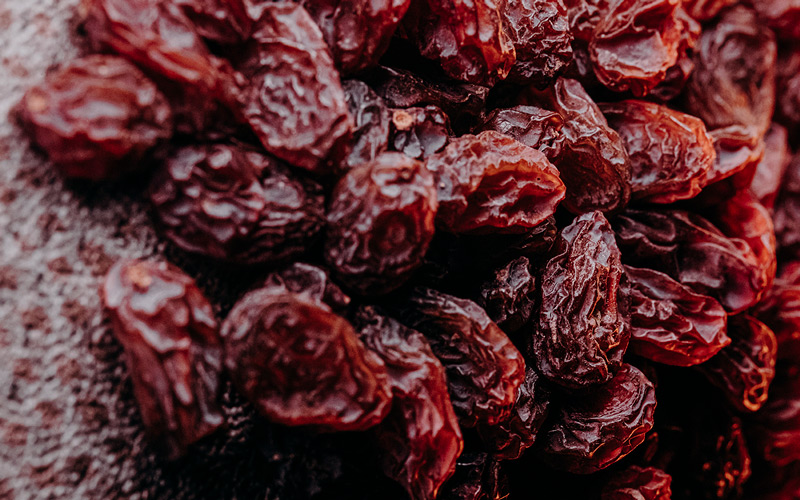A raisin is a dried grape. Raisins are produced in many regions of the world especially in Iran and may be eaten raw or used in cooking, baking, and brewing.
Our dark raisins are fabulously sweet and chewy. Eat them as a healthy snack, or add them to oatmeal, cereals, and salads. One of our favorite ways to enjoy them is in oatmeal raisin cookies. Even the kids are interested in these yummy dark raisins. As a great source of antioxidants, fiber, iron, and other minerals, raisins are an excellent treat that will keep your health in the best shape.
Health Benefits of Raisins
- Support the Heart - Raisins are a heart-healthy food that can decrease harmful cholesterol levels. Naturally low in calories and high in soluble fiber, raisins stabilize blood sugar levels and reduce the uptake of cholesterol into the bloodstream. A 2012 study led by the University of Connecticut found that people who consumed one cup of raisins per day and walked regularly reduced their LDL cholesterol levels.
- Build Strong Bones - Bones are the support system of the entire body, so it’s important to keep them healthy and strong. Raisins are a remarkable source of a trace element known as boron, which plays a critical role in bone health. Research suggests that boron supplementation can reduce the risk for osteoporosis, a disease in which the bones become fragile and weak.
- Protect the Eyes - The antioxidants present in raisins can aid keep your eyes healthy greatly into your golden years. Vitamin A and carotenoids protect the eye’s retina by preventing oxidation caused by UV rays. They also decrease the risk for age-related macular degeneration, the leading cause of blindness among older adults.
- Lower Blood Sugar - Blood sugar spikes can put a main strain on your metabolism and are especially harmful for diabetics, but enjoying raisins on a daily basis can help. A 2012 study presented at the American Diabetes Association’s 72nd Annual Scientific Session found that people who snacked on raisins three times a day for 12 weeks reduced their average post-meal glucose levels by 16 percent.
- Promote Healthy Teeth & Gums - The next time you’re looking for a sweet treat your dentist will approve of, snack on a handful of dark raisins. Research presented at the American Society for Microbiology pinpointed five compounds in raisins that fight oral bacteria associated with cavities, tooth decay and gum disease. Now that should keep your pearly whites smiling!
Raisins are dried grapes/currants. However, unlike fresh grapes, they indeed are rich and concentrated sources of energy, vitamins, electrolytes, and minerals. On weight per weight comparison basis, 100 g of dried grapes hold 249 calories, several times more fiber, vitamins, minerals and poly-phenol antioxidants than the fresh grapes. Raisins, however, contain fewer amounts of vitamin C, folic acid, carotenes, lutein and xanthins than fresh grapes.
In general, fresh grapes, either seedless or seed types of the Vinifera species such as Thompson seedless (Sultana), Sugarone, Calmeria, Corinth and etc, are subjected to dry under sunlight or mechanical drying techniques. In some cases, the whole bunch of grapes may be allowed to dry on the vine itself (vine-dried). Ordinarily, their moisture content should not exceed 16% of dry weight. Thoroughly dried raisins are then further stemmed, cap-stemmed, sorted, and cleaned in order to obtain high quality, dried berries. At the commercial level, raisins are processed and graded further before sent to the markets.
Types of Processed Raisins:
- Golden seedless.
- Raisins with seeds.
- Zante currant.
- Mixed types or varieties.
Preparation and Serving Method
Raisins are one of the most sought-after items used in the confectionary.
Here are some serving tips:
They can be enjoyed as a snack, all alone without any additions.
Sprinkle over to enrich fruit salads and ice creams, desserts and etc.
Add to bakery items like chocolates, cookies, muffins, bread, puddings, biscuits, cakes, waffles and etc.
In Iran, India, Pakistan and other South Asian region where they are popular as Kishmish (sultanas), added to various sweet delicacies.
They can be enjoyed with other dry fruits (apricots, dates, prunes) and nuts like almonds, cashews, macadamias and etc.




